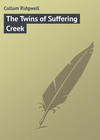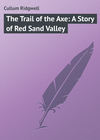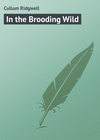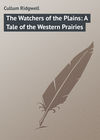Читать книгу: «The Twins of Suffering Creek», страница 6
CHAPTER VI
SUNNY OAK PROTESTS
Wild Bill was gazing out across the camp dumps. His expression suggested the contemplation of a problem of life and death, and a personal one at that. Sandy Joyce, too, bore traces suggestive of the weightiest moments of his life. Toby Jenks stood chewing the dirty flesh of a stubby forefinger, while the inevitable smile on Sunny Oak’s face made one think of a bright spring morning under cover of a yellow fog.
“How am I to see to them pore kiddies?” the latter was complaining. “I’ve had to do with cattle, an’ mules, an’ even hogs in my time, but I sure don’t guess you ken set them bits o’ mites in a brandin’ corral, nor feed ’em oats an’ hay, nor even ladle ’em swill for supper, like hogs. Fer other things, I don’t guess I could bile a bean right without a lib’ry o’ cook-books, so how I’m to make ’em elegant pap for their suppers ’ud beat the Noo York p’lice force. An’ as fer fixin’ their clothes, an’ bathing ’em, why, it ’ud set me feelin’ that fulish you wouldn’t know me from a patient in a bug-house. It makes me real mad, folks is allus astin’ me to get busy doin’ things. I’m that sick, the sight of a ha’f-washened kid ’ud turn my stummick to bile, an’ set me cacklin’ like a hen with a brood o’ ducklings she can’t no ways account fer. You’se fellers are a happy lot o’ Jonahs to a man as needs rest.”
“You’re sure doing the cacklin’ now,” observed Bill contemptuously.
“Maybe he’s layin’ eggs,” murmured Toby vaguely.
The men were standing on the veranda, gathered round the bench on which Sunny Oak was still resting his indolent body. And the subject of their discourse was Scipio’s two children. The father had ridden off on his search for James, and the responsibility of his twins was weighing heavily on those left behind.
“Kind o’ handy ladlin’ it out to folks,” said Sunny, grinning lazily. “But, with all your brightness, I don’t guess any o’ you could mother them kiddies. No, it’s jest ’send Sunny along to see to ’em.’ That bein’ said, you’ll git right back to your poker with a righteous feelin’ which makes it come good to rob each other all you know. Psha! You ain’t no better’n them lousy birds as lays eggs sizes too big, an’ blames ’em on to some moultin’ sparrer that ain’t got feathers ’nuff to make it welcome at a scratchin’ bee.”
Sunny’s flow was a little overwhelming, and perhaps there was just enough truth in his remarks to make it unadvisable for the others to measure wits with him. Anyway, he received no reply. Bill continued to gaze out at Scipio’s hut in a way that suggested great absorption, while Toby had not yet lunched sufficiently off his tattered forefinger. Sandy was the only one of the three apparently alive to the true exigencies of the case, and Sunny addressed himself more exclusively to him.
“Say,” he went on, his good-humored eyes smiling cunningly up into the widower’s face, “I’ve heerd tell that you once did some pore unsuspicious female the dirty trick of marryin’ her. Mebbe you’ll sure hev’ notions ’bout kiddies an’ such things. Now, if Wild Bill had come along an’ pushed a shootin’-iron into your map, an’ said you’ll handle Zip’s kiddies–wal, I ask you, wot ’ud you ha’ done?”
“Told him to git his head cooled some,” retorted Sandy promptly.
“Ah, guess you bin saved a heap o’ trouble,” murmured Sunny. “But if you hadn’t said that–which you said you would ha’ said–an’ you’d got busy as he suggested–wal, what then?”
Sandy cleared his throat, and, in his sudden interest, Toby deferred the rest of his meal.
“Wal, I’d ha’ gone right up to the shack an’ looked into things.”
Sandy’s first effort seemed to please him, and, hitching his moleskin trousers up deliberately, he proceeded with some unction–
“Y’see, ther’ ain’t nothin’ like gettin’ a look around. Then you kind o’ know wher’ you are. You sure need to know wher’ you are ’fore you get busy proper. It’s most like everything else. If you get on the wrong trail at the start, it’s li’ble to lead you wher’ you don’t want to go. What I says is, hit the right trail at the start, then you got a chance o’ gettin’ thro’ right, which, I take it, is an elegant way o’ doin’ most things. Wal, havin’ located the right trail–”
“We’re talkin’ o’ Zip’s twins,” murmured Sunny gently.
“Sure, that’s where I’m gettin’ to–”
“By trail?” inquired Toby seriously.
“Say, you make me tired,” retorted Sandy angrily.
“Best quit the trail, then,” said Sunny.
“Go to blazes!” cried Sandy, and promptly relapsed into moody silence.
At that moment Bill turned from his contemplation of the house beyond the dumps and fixed his fierce eyes on Sunny’s grinning face.
“Here, you miser’ble hoboe,” he cried, “get right up out of that, and hump across to Zip’s shack. You’re doin’ enough gassin’ fer a female tattin’ bee. Your hot air makes me want to sweat. Now, them kiddies’ll need supper. You’ll jest ast Minky fer all you need, an’ I pay. An’ you’ll see things is fixed right for ’em.”
Sunny lurched reluctantly to his feet. He knew the gambler far too well to debate the point further. He had made his protest, which had been utterly ineffective, so there was nothing left him but to obey the fiercely uttered mandate.
But Sandy Joyce felt that somehow his first effort on behalf of the children had missed fire, and it was his duty not to allow himself to be ousted from the council. So he stayed the loafer with a word.
“Say, you’ll be knowin’ how to feed ’em?” he inquired gravely.
Sunny’s eyes twinkled.
“Wal, mebbe you ken give me pointers,” he retorted, with apparent sincerity.
“That’s how I was figgerin’,” said Sandy cordially. He felt better now about his first effort. “Y’see, Minky’s stock is limited some; ther’ ain’t a heap o’ variety, like. An’ kiddies do need variety. Y’see, they’re kind o’ delicate feeders, same as high-bred hosses, an’ dogs an’ things. Now, dogs need diff’rent meat every day, if you’re goin’ to bring ’em up right. A friend o’ mine sure once told me that meat, good meat, was the best feed fer prize dogs, an’ he was a feller that won a heap o’ prizes. He had one, Boston bull, I–”
“’ll I need to git dog-biscuit for them kiddies?” inquired Sunny sarcastically.
“Say, you make me sick,” cried Sandy, flushing angrily.
“Guess that’s how you’ll make them kiddies,” interposed Toby.
Sandy glanced viciously from one to the other. Then, assuming a superiority that scarcely hid his chagrin, he ignored the interruptions.
“You best ast Minky fer some dandy canned truck,” he said decisively, deliberately turning his back on Toby Jenks. “Mebbe a can o’ lobster an’ one o’ them elegant tongues stewed in jelly stuff, an’ set in a glass bowl. Y’see, they kids needs nourishin’, an’ that orter fix them ’bout right. I don’t know ’bout them new sides o’ sow-belly Minky’s jest had in. Seems to me they’ll likely need teeth eatin’ that. Seein’ you ain’t a heap at fixin’ beans right, we best cut that line right out–though I ’lows there’s elegant nourishin’ stuff in ’em for bosses. Best get a can o’ crackers an’ some cheese. I don’t guess they’ll need onions, nor pickles. But a bit o’ butter to grease the crackers with, an’ some molasses an’ fancy candy, an’ a pound o’ his best tea seems to me ’bout right. After that–”
“Some hoss physic,” broke in Toby, recommencing the chewing of his forefinger.
But Wild Bill’s fierce eyes were on Sandy, and the erstwhile married man felt their contempt boring into his very soul. He was held silent, in spite of his anger against the broad-shouldered Toby, and was possessed of a feeling that somehow his second effort had been no more successful than his first. And forthwith the impression received confirmation in a sudden explosion from Wild Bill.
“Jumpin’ mackinaw!” he cried, with a force calculated to crush entirely the remnants of Sandy’s conceit. “You’d sure shame a crazy sheep fer intellect.” Then he added, with withering sarcasm, “Say, don’t you never leave your mouth open more’n two seconds at a time, or you’ll get the flies in it, an’–they’ll start nestin’.”
Then without pause he turned on Sunny and delivered his ultimatum.
“Get busy,” he ordered in a tone there was no denying.
And somehow Sunny found himself stirring far more rapidly than suited his indolent disposition.
Having thoroughly disturbed the atmosphere to his liking, Bill left the veranda without another look in his companions’ direction, and his way took him to the barn at the back of the store.
The gambler was a man of so many and diverse peculiarities that it would be an impossibility to catalogue them with any degree of satisfactoriness. But, with the exception of his wholesale piratical methods at cards–indeed, at any kind of gambling–perhaps his most striking feature was his almost idolatrous worship for his horses. He simply lived for their well-being, and their evident affection for himself was something that he treasured far beyond the gold he so loved to take from his opponents in a gamble.
He possessed six of these horses, each in its way a jewel in the equine crown. Wherever the vagaries of his gambler’s life took him his horses bore him thither, harnessed to a light spring cart of the speediest type. Each animal had cost him a small fortune, as the price of horses goes, and for breed and capacity, both in harness and under saddle, it would have been difficult to find their match anywhere in the State of Montana. He had broken and trained them himself in everything, and, wherever he was, whatever other claims there might be upon him, morning, noon and evening he was at the service of his charges. He gloried in them. He reveled in their satin coats, their well-nourished, muscular bodies, in their affection for himself.
Now he sat on an oat-bin contemplating Gipsy’s empty stall, with a regret that took in him the form of fierce anger. It was the first time since she had come into his possession that she had been turned over to another, the first time another leg than his own had been thrown across her; and he mutely upbraided himself for his folly, and hated Scipio for having accepted her services. Why, he asked himself again and again, had he been such an unearthly fool? Then through his mind flashed a string of blasphemous invective against James, and with its coming his regret at having lent Gipsy lessened.
He sat for a long time steadily chewing his tobacco. And somehow he lost all desire to continue his poker game in the store. His whole mind had become absorbed by thoughts of this James, and though he, personally, had never suffered through the stage-robber’s depredations, he found himself resenting the man’s very existence. There were no ethical considerations in his mind. His inspiration was purely personal. And though he did not attempt to reduce his hatred to reason, nor to analyze it in any way, the truth of its existence lay in the fact of a deadly opposition to this sudden rise to notoriety of a man of strength, and force of character similar, in so many respects, to his own. Perhaps it was mere jealousy; perhaps, all unknown to himself, there was some deeper feeling underlying it. Whatever it was, he had a strong sympathy with Scipio, and an unconquerable desire to have a hand in the smoothing out of the little man’s troubles.
He did not leave the barn, and scarcely even took his eyes off Gipsy’s empty stall, until nearly sundown. Then, as he heard the voices of returning prospectors, he set to work on his evening task of grooming, feeding, watering and bedding down his children for the night.
CHAPTER VII
SUNNY OAK TRIES HIS HAND
In the meantime Sunny Oak was executing his orders with a care for detail quite remarkable in a man of his excessive indolence. It was a curious fact, and one that told a great deal of his own character, as well as that of the gambler. His implicit obedience to Wild Bill’s orders was born of a deeper knowledge of that individual than was possessed by most of his comrades in Suffering Creek. Maybe Minky, who was Bill’s most intimate friend, would have understood. But then Sunny Oak possessed no such privilege. He knew Bill through sheer observation, which had taught him to listen when the gambler spoke as he would listen to a man in high authority over him–or to a man who, without scruple, held him helpless under an irresistible threat. Which power it was inspired his obedience he did not pause to consider. He simply accepted the fact that when Bill ordered he preferred to obey–it was so much easier.
“Hoboe”–the local term for one suffering from his indolent malady–as he was, Sunny Oak was a man of some character. Originally this cloak of indolence in which he wrapped himself had been assumed for some subtle reason of his own. It was not the actual man. But so long had he worn it now that he had almost forgotten the real attributes enshrouded in its folds. As a matter of fact, he was very much a man, and a “live” man, too. He really possessed an extraordinary energy when he chose to exercise it. But it was generally his habit to push his interest aside for the easier course of indifference. However, his capacity was none the less there.
His other possessions, too, were excellent in their way, although he had encouraged the germ of rust in a deplorable degree. His good-nature would not be denied, and was obvious to all. But an extremely alert mind, an infinite resource of keen, well-trained thought, a profound love of the beautiful, a more commonplace physical courage supported by the rarer moral courage, he contrived to keep well hidden from the vulgar gaze.
These were some of the features so long concealed under the folds of his cloak of indolence that even he had almost forgotten their existence. Thus it was, in all seriousness, he cried out bitterly in protest when an attempt was made to lift the covering and lay bare the man beneath it. And his lamentations were perfectly genuine.
After leaving the store with a sack of provisions over his shoulder he grumbled his way across the dumps to Scipio’s house. He cursed the weight he was forced to carry, and anathematized the man who had driven him to so bestir himself. He lamented over this waste of his precious energies, he consigned Scipio and his children to eternity, and metaphorically hurled Jessie headlong to the depths of the uttermost abyss of the nether-world. But he went on. In spite of his foulest language and vilest epithets, it was his full intention to do his best for the children.
What he found on entering Scipio’s hut set his small eyes twinkling again. His unclean face creased up into a grin, and, softly tiptoeing to a far corner of the room, he deposited his sack with the greatest care. Then he stood up, and his eyes fixed themselves on a curious heap under the table. It was a tumbled pile of pale blue, dirty white, with a four-legged dash of yellow. And out of the heap he made the forms of two small sleeping children, each hugging in their arms an extremity of a yellow cur pup, also sound asleep, in the shaft of sunlight which flooded in through the open doorway.
Sunny rubbed his eyes and thought hard, nor did he find the process irksome. From the miserable camp pup he glanced at the grubby face of Jamie. Then his eyes passed on to Vada’s pretty but equally dirty features. And swift action at once followed his thought. He glanced at the dying fire in the cookstove, and saw the small clothes hanging on the chair in front of it. He felt them; they were quite dry. Then he tried the kettle on the stove; it still had water in it. Then he went to the fuel-box; yes, there was fuel.
Now with his fingers he replenished the fire, and noiselessly re-filled the kettle. Then he removed the clothes and put the chair aside. The children still slept on. He further investigated the resources of Scipio’s ménage. He found a wash-bowl and soap and a towel, three things he rarely sought for any purposes of his own. Then, after looking into the cupboard, he shook his head. It was deplorably bare of all but uncleanliness. And it was the former that caused his headshake, not the latter. With some pride he re-stocked the shelves with the liberal purchases he had made at Bill’s expense. He had provided everything that a man’s mind could conceive as being necessary for the interior of healthy childhood. True, he had made no provision for a yellow pup.
By this time the kettle was boiling, and it served him as a signal. In a harsh, untuneful voice he began to chant an old coon-ditty. The effect of his music was instantaneous as regards the more sensitive ears of the pup. Its eyes opened, and it lifted its head alertly. Then, with a quick wriggle, he sat up on his hind quarters, and, throwing his lean, half-grown muzzle in the air, set up such a howl of dismay that Sunny’s melody became entirely lost in a jangle of discords. He caught up his empty sack and flung it at the wailing pup’s head. It missed its aim, and in a moment the twins had joined in their yellow friend’s lament.
Sunny never quite understood the real cause of that dismal protest–whether it was the sight of him, his doleful singing, or the flinging of the sack. All he knew was that it was very dreadful, and must be stopped as quickly as possible. So, to that end, he began to cajole the children, while he surreptitiously let fly a kick at the pup.
“Say, you bonny kids, you ain’t scairt o’ poor Sunny Oak,” he cried, while a streak of yellow flashed in the sunlight and vanished through the door, a departure which brought with it renewed efforts from the weeping children. “It’s jest Sunny Oak wot nobody’ll let rest,” he went on coaxingly. “He’s come along to feed you supper. Say,” he cried, laboring hard for inspiration, “it’s such a bully supper. Ther’s molasses, an’ candy, an’–an’ lob-ster!”
Whether it was the smacking of his lips as he dwelt on the last word, or whether it was merely the fact that their fright was passing, matters little; anyhow, the cries of the twins died out as suddenly as they began, and their eyes, big and round, gazed wonderingly up at Sunny’s unkempt face.
“Who’s you, ugly man?” asked Vada at last, her brain working more quickly than her brother’s.
“’Ess–ug’y man,” added Jamie unmeaningly.
Sunny’s hand went up to his face, and he scratched amongst his sparse beard as though to test the accuracy of the accusation. Then he grinned sheepishly.
“Guess I’m jest an ugly fairy that wants to be kind to two lonesome kiddies,” he beamed.
“O–oh! You’se a fairy?” said Vada doubtfully.
“’Ess,” nodded Jamie, thrilling with wonderment, and eyeing him critically.
Elated with his success, Sunny went on warmly–
“Yep. Jest a fairy, an’ I bro’t a heap o’ good grub fer you kiddies t’ eat.”
But Vada’s small brain was following out its own train of thought, and passed the food question by.
“Awful ugly,” she said, half to herself.
“’Ess,” muttered Jamie abstractedly.
“Mebbe,” said Sunny, with a laugh. “Wal, if you crawl right out o’ there an’ git around, I got things fixed so we’ll hev’ a bully time.”
But his proposition hadn’t the effect he hoped. Instead of moving, Jamie suddenly beat his head with his little clenched fists.
“Me wants yaller pup,” he cried, and forthwith howled afresh.
Again Sunny realized his helplessness, and, glancing about for further inspiration, caught sight of an inquiring yellow head peering furtively in through the doorway.
“Why, ther’ he is,” he cried, vainly hoping to pacify the child. Then he began at once a clumsy encouragement of the dog. “Here, you yeller feller,” he cried, flicking his fingers coaxingly. “Come along! Gee, you’re a pretty feller. Hi! come along here.”
But the dog made no attempt to move, and Sunny began to lose patience. “Come along, pups,” he cried, with increasing force. “Come on, you miser’ble rat. Don’t stan’ ther’ waggin’ your fool tail like a whisk-broom. Say, you yaller cur, I’ll–” He started to fetch the creature, but in a twinkling it had fled, to the accompaniment of a fresh outburst from Jamie.
“I tho’t you was a fairy,” protested Vada. “Fairies ken do most anything. You’re jest an ugly ole man.”
Sunny stood up and drew the back of his hand across his perspiring forehead. He was worried. The fairy business was played out, and he felt that he must begin again. Children were by no means as easy to handle as he had thought. He racked his brains, and suddenly bethought him of another move.
In spite of Jamie’s whimpering, he went to the cupboard and produced a tin of molasses. This he carefully opened in full view of Vada’s questioning eyes. Jamie had also become silent, watching him intently. He dug his finger into the sticky contents and drew it out. Then he licked his finger with tremendous enjoyment.
“Bully,” he muttered, apparently ignoring the children.
Instantly Vada was on her knees, crawling from under the table, followed closely by her faithful shadow. She came cautiously up to Sunny’s side and stood up.
“M’lasses?” she inquired, and her eyes spoke volumes.
“O-oh!” muttered Jamie, scrambling to his feet beside her holding up one fat hand.
Sunny, without replying, allowed them to dip their fingers into the pot and taste the molasses. He felt that the moment was critical, and he would not risk words which might easily set them scuttling back to their stronghold.
His strategy was successful. Up came the hands again, and he knew he had won their confidence. He allowed them another dip into the pot, and then began the business in hand.
“We’ll save the rest fer bimeby,” he said decidedly. “Meanwhiles we’ll fix things right.”
“Wot things?” inquired Vada.
“M’lasses,” said Jamie, with tearful eyes.
Again Sunny felt the crisis, but he carried the situation with a firm hand.
“Bimeby, laddie,” he said cheerfully. “Meanwhiles we’ll jest have a wash all round.”
And forthwith he set the wash-bowl ready and filled it with warm water. Then, after some consideration and trouble, having discovered a rag which had been used in the household “wash-up,” and a piece of soap, he prepared to start on little Vada. But she instantly protested.
“You first, Mister Fairy,” she said cheerfully. “My poppa allus washes first. Then we has his water.”
“’Ess,” agreed Jamie.
And, to his disgust, Sunny was forced to an unwilling ablution, which, by strategy, he had hoped to escape. However, the ordeal was manfully borne, and his reward was quite worth his trouble. Vada promptly exclaimed when she saw his face emerge from the dirty towel, shining with grease off the house-flannel.
“You’se a fairy, sure,” she cried, clapping her hands and dancing about gleefully. “On’y fairies can change theirselves. You’se a pretty, pretty man–now. Now, Jamie dear. You next,” she added, with feminine assurance. And with clumsy but willing enough hands Sunny Oak contrived to cleanse his charges.
By the time his task was accomplished perfect good-will reigned all round, and the climax was reached when the yellow pup returned of its own accord, and was promptly hugged to Jamie’s affectionate little bosom.
The next thing was to prepare the children’s supper. This was a far more serious matter for the loafer. But he finally achieved it, having learnt, by the process of cross-questioning the girl, what was usual and therefore expected. However, it was not without some difficulty that he succeeded in providing an adequate meal, which consisted of bread and milk, with bread and molasses as a sort of dessert. For himself, he was forced to fare off a tin of lobster and tea. Still, his difficulties were not of much consequence so long as the children were satisfied. And any bother to himself was his own fault, in having relied for a moment on Sandy Joyce’s ideas of a menu.
Supper over and the table cleared, he decided on further catechizing little Vada on points that still were a mystery to him. So, with Jamie busy on the floor endeavoring to solve the mystery of the pup’s wagging tail, he lit his pipe and took Vada on his knee. He endeavored to recall incidents of his own childhood; to remember something of his own early routine. But somehow nothing was very clear.
He had washed the children and given them food. Those things seemed to him to be perfectly sound. Well, what next? It was a little difficult. He glanced at the sun. Surely bed would be quite in order. Bed–ah, yes, that was a happy thought. He remembered now, when he was young he always used to get himself into trouble purposely so they would send him to bed. But with this thought came the regretful recollection that his predilection for bed was quickly discovered, and his further penalties took the form of the buckle end of his father’s waist-belt. However, he put the proposition with much tact.
“Say, kiddies,” he began, “how soon does your momma put you to bed?”
Vada shook her wise little head.
“Momma don’t. Poppa does.”
“And when’s that?” he inquired, driving at his point deliberately.
“When momma says.”
Vada was fastening and unfastening the man’s dirty waistcoat with great interest.
“An’ when does your momma say it?” Sunny persisted.
“When poppa’s done the chores.”
“Ah!”
He felt himself on the wrong tack, and cast about for a fresh line of argument.
“Guess you kiddies like bed some,” he hazarded doubtfully.
“Me like m’lasses,” piped Jamie, who had managed to get the pup’s tail over his shoulder, and was hanging on to it with both hands. Vada shrieked as the pup began to yelp.
“Oh, look at Jamie,” she cried. “He’s pulling Dougal’s tail right out. You’re a naughty, naughty boy.”
“Not naughty,” protested Jamie, pulling harder.
Sunny reached down and released the mongrel, who promptly turned round and licked the boy’s face. Jamie fought him with his little clenched fists, and finally began to cry.
Again Sunny went to the rescue, and with some difficulty peace was restored. Then he went back to his subject.
“Guess we’ll hev to go to bed right now,” he suggested, with an air of authority.
“Momma ain’t back,” said Vada, her eyes round and wondering.
“She’ll be right along presently,” lied Sunny.
“’Ess,” declared Jamie, “an’–an’–we go find ’piders an’–an’ bugs.”
Vada nodded.
“Lots an’ lots.”
“That’s to-morrow,” said Sunny, taking his cue wonderingly.
“Poppa ain’t back neither,” protested Vada.
“He’s gone visitin’,” said Sunny. “Maybe he’ll be late. Guess he’s havin’ a hand at poker down at the store.”
Sunny was getting uncomfortably hot. Lies came easily enough to him in the ordinary way, but with these poor children it was somehow different.
“Poppa don’t play poker,” defended Vada. “On’y wicked men does.”
“’Ess,” agreed Jamie.
“That’s so.” Sunny felt himself on dangerous ground.
He smoked on thoughtfully for some moments. He felt that a desperate move was required, and considered how best to make it. Finally he resolved that he must assert his authority. So, setting Vada on the ground, he stood up.
“Bed,” he said, with a great assumption of finality.
Vada’s eyes rolled ominously, and a pucker came to her little sunburnt brow. Jamie offered no preliminary, but howled at once. And when, after the slightest hesitation, Vada joined in his lament, Sunny’s distress became pitiable. However, he managed to ease his feelings by several well-directed mental curses at Wild Bill’s head, and all those others concerned in reducing him to his present position. And with this silently furious outburst there came a brain-wave of great magnitude.
“First in bed sure gets most m’lasses,” he cried, darting to the cupboard door and holding the well-smeared pot up above his head.
The children’s cries ceased, and for a second they stood staring up at him. Then, like a pair of rabbits, they turned and ran for the bedroom, vanishing behind the curtain amidst shrieking excitement. Sunny followed them with the molasses and a handful of crackers.
They were both on the bed when he passed into the room, huddling down under a couple of cotton blankets. The man glanced round him. On the other side of the room was the big bed where their father and mother slept. Both beds were unmade, and the room was littered with feminine garments in a manner that suggested the mother’s hasty flight. Hardened as he was, the sight and all it suggested depressed him. But he was not allowed much time for reflection. Two childish voices shrieked at him at once.
“Me first!” they cried in one breath.
And Sunny ladled them out molasses and crackers to their hearts’ content. When they had eaten all he thought good for them Vada scrambled to her knees.
“Prayers,” she said, and clasped her hands before her face.
Jamie wobbled up to her side and imitated her. And Sunny stood by listening wonderingly to something that brought back a world of recollection to him. It brought him more. It laid before him a mental picture of his present manhood which somehow nauseated him. But he stood his ground till the final “Amens,” then he hustled the twins almost roughly into the blankets, and, having extracted a promise from them not to leave the bed again until he returned, hurried out of the room.
He stood for a moment in the living-room. He was in a doubt that almost confused him. Mechanically he looked at the stove. The fire was quite safe. The window was secure. Then he moved to the door. There was a lock to it and a key. He passed out, and, locking the door behind him, removed the key.
“Gee!” he exclaimed, drinking in a breath of the evening air, “five minutes more o’ that an’ I’d ’a’ bin singin’ funeral hymns over my past life. Gee!”
Ten minutes later he was in Wild Bill’s hut down at the camp, and had finished his account of his adventures.
“Say,” he finished up peevishly, “ther’s things a feller can do, an’ things he sure can’t. I tell you right here I ain’t learned how to cluck to my chicks, an’ I ain’t never scratched a worm in my life. I ’low I’m too old to git busy that ways now. If you’re goin’ to raise them kids fer Zip while he’s away, it’ll need a committee o’ us fellers. It’s more’n one feller’s job–much more. It needs a wummin.”
Bill listened patiently until his deputy had aired his final grievance. His fierce eyes had in them a peculiar twinkle that was quite lost on Sunny in his present mood. However, when the injured man had finished his tale of woe the gambler stretched his long legs out, and lolled back in his chair with a fresh chew of tobacco in his mouth.




















